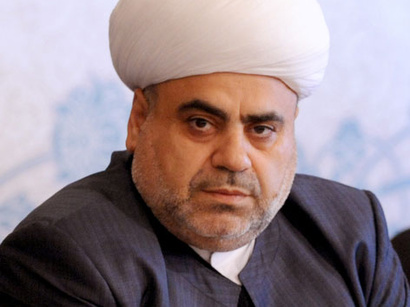Azerbaijani religious leader calls for fair solution of Nagorno-Karabakh conflict

By Sara Rajabova
Head of Caucasus Muslims Office, Sheikh ul-Islam Allahshukur Pashazadeh, has called on religious figures to continue their efforts to find a fair solution within the international legal norms for the Nagorno-Karabakh conflict.
"At present, when our country insists on a fair settlement of the conflict within the international legal norms, we, as religious figures also continue exerting efforts in this sphere," Pashazadeh said in an interview with Trend news agency.
The Nagorno-Karabakh conflict emerged in 1988 when Armenia made territorial claims against Azerbaijani lands.
He went on to note that the religious figures of the involved countries have a big responsibility.
"From the very beginning of the Nagorno-Karabakh conflict, while realizing this mission, we gathered around a round table," Pashazadeh said, adding that they had their first meetings in Rostov, and then in Moscow, and Montreux back in 1988.
Pashazadeh said the meetings, except for the one held in Montreux, were held with the mediation of the Russian Orthodox Church.
He said the main mission of these meetings was to prevent an ethnic and territorial conflict from turning into a religious one.
According to Pashazadeh, the reached agreements, and the signed documents prove that the mission was accomplished.
"We serve to building a confidence between the two nations by our agreements on mutual protection of religious and spiritual monuments, returning of captives, withdrawing of snipers from the contact line, and other issues," he said.
"That's why in 2010, we met with Catholicos of All Armenians Karekin II as part of the Baku summit with mediation of Patriarch of Moscow and All Russia Kirill," Pashazadeh said. "Another meeting was held on the sidelines of the presidium of the CIS Inter-Religious Council meeting in Yerevan."
Through these negotiations, the sides intended to assist in reaching a peaceful solution for the Nagorno-Karabakh conflict.
Pashazadeh noted if these negotiations and meetings can even slightly influence on this process, the sides must continue to hold them.
Pashazadeh went on to say that his meeting with an Armenian captive kept in Azerbaijan upon the request of the Catholicos of all Armenians was aimed to demonstrate the conscientious adherence to the spirit of joint statements.
"Karabakh is our historical territory. We must continue exerting efforts until our lands are liberated. This is our duty to God, the Motherland and people," Pashazadeh said.
Referring to destruction of the cultural, religious and historical monuments in the occupied Azerbaijani territories, Pashazadeh said the topic was repeatedly discussed during the meetings with the religious leader of the Armenians.
"What happened cannot be turned back, and our goal now is to prevent such incidents and in particular, to reconstruct all cultural, religious, and historical monuments after the end of the occupation," he said.
Pashazadeh also said this issue is clearly indicated in each joint statement, and the demonstration of the Armenian side's will is required.
"We raise the issue at all events in which we are involved. From the very significant platforms, we are trying to direct the opinion of the international community to prevent such cases," he said.
Pashazadeh said Islamic countries always express their support and these monuments are common Islamic monuments.
"The appropriate measures are being taken through the Organization of Islamic Cooperation (OIC) and ISESCO and significant assistance is being rendered," he said.
OIC member states expressed concern over the occupation of Azerbaijani territories and looting and destruction of the archeological, cultural and religious monuments in those areas, including Islamic monuments in the resolution adopted by the organization during the OIC summit in Dakar, Senegal in 2008.
Since a lengthy war in the early 1990s that displaced over one million Azerbaijanis, Armenian armed forces have occupied over 20 percent of Azerbaijan's internationally recognized territory, including Nagorno-Karabakh and seven adjacent regions.
The UN Security Council has adopted four resolutions on Armenia's withdrawal from the Azerbaijani territory, but they have not been enforced to this day.
Peace talks mediated by Russia, France and the US have produced no results so far.
Here we are to serve you with news right now. It does not cost much, but worth your attention.
Choose to support open, independent, quality journalism and subscribe on a monthly basis.
By subscribing to our online newspaper, you can have full digital access to all news, analysis, and much more.
You can also follow AzerNEWS on Twitter @AzerNewsAz or Facebook @AzerNewsNewspaper
Thank you!
